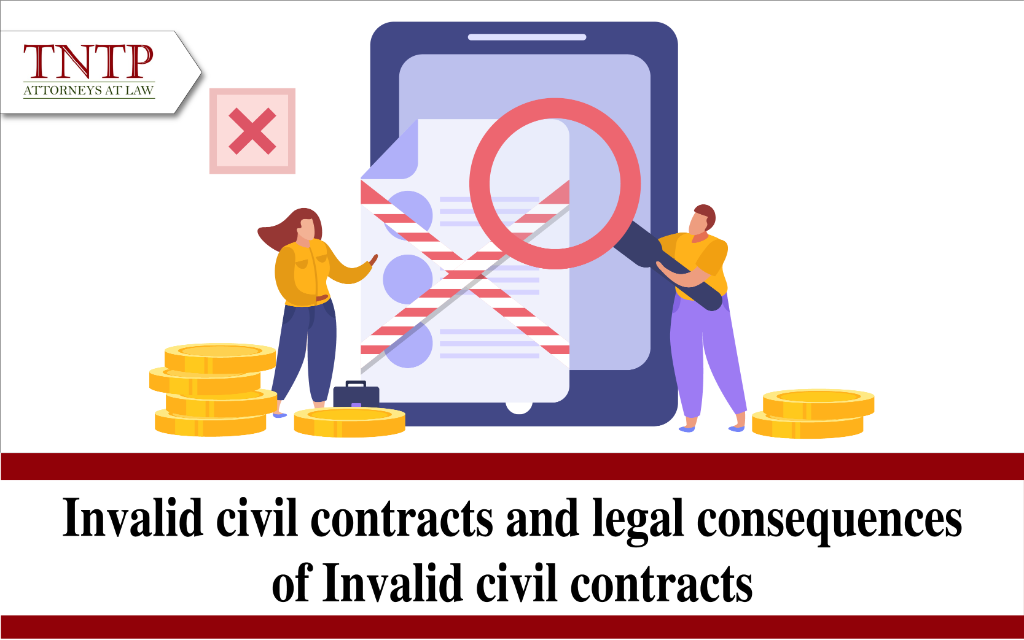Invalid civil contracts and legal consequences of invalid civil contracts

Invalid civil contracts and the legal consequences of invalid civil contracts are important topics in contract law. An invalid civil contract is a civil transaction that expresses the will of the participating parties but violates the conditions for the contract’s validity as stipulated in the Civil Code. In the following article, TNTP will present the basic information you need to know about invalid civil contracts and the legal consequences of invalid civil contracts.
1. Recognizing invalid civil contracts
Article 122 of the 2015 Civil Code stipulates: “Civil transactions which fail to satisfy any one of the conditions specified in Article 117 of this Code shall be invalid.”. Additionally, Clause 1, Article 407 of the 2015 Civil Code states, “The provisions on invalid civil transactions in Articles 123 to 138 inclusive of this Code shall also govern invalid contracts.”. Therefore, a contract that fails to satisfy the requisite legal conditions for validity as prescribed by law, or in cases where the law stipulates otherwise, is considered an invalid civil contract.
Cases of invalid civil contracts include the following:
• Invalid contracts due to failure to meet validity conditions, specifically:
The purpose and content of the contract breach of legal prohibitions or contravention of social ethics;
The parties entering into the contract were deceived, threatened, or coerced;
The contract was established fraudulently;
The parties establishing and executing the contract are minors or legally incapacitated persons or persons with limited cognition and behaviour control or persons with limited legal capacity;
The parties entered into the contract due to a misunderstanding;
The parties entered into the contract at a time when they were lacking in cognition and behaviour control;
The contract does not comply with the required form.
However, the 2015 Civil Code also stipulates that in certain cases, even if a civil contract is established under the aforementioned conditions of invalidity, the contract may still be valid. For example, if the contract has been established as required to be in writing but the document does not comply with the stipulations of the law, and one or both parties have already performed at least two-thirds of their obligations in the transaction, then upon the request of one or both parties, the court may issue a decision recognizing the validity of that transaction.
• Invalidity of civil contracts due to the impossibility of performing subject
If at the time of entering into the contract, the contract has a subject that cannot be performed, then this contract is invalid. This provision applies in cases where the contract has one or more parts of the subject that cannot be performed, but the remaining parts of the contract are still valid.
• Invalidity of civil contracts due to the invalidity of principal contract
The invalidity of the principal contract results in the termination of the ancillary contract, unless the parties agree that the ancillary contract replaces the main contract. This provision does not apply to types of security for the performance of obligations. The invalidity of the ancillary contract does not terminate the principal contract unless the parties agree that the ancillary contract is an inseparable part of the principal contract.
• Invalidity of the civil contract according to the specific provisions
In addition to the 2015 Civil Code, which specifies cases of contract invalidity, specialized laws also have their provisions regarding the invalidity of contracts. The contract will be governed by the relevant specialized law, which will be applied to resolve the declaration of invalidity of the contract and the legal consequences resulting from its invalidity.
2. Legak consequences of invalid civil contracts
The legal consequences of an invalid contract are carried out according to the provisions of Article 131 of the 2015 Civil Code. Accordingly, an invalid contract will lead to the following legal consequences:
• An invalid civil transaction shall not give rise to, change or terminate any civil rights and obligations of the parties as from the time the transaction is entered into.
If a civil contract is legally entered into, it becomes effective in practice. In the case of an invalid civil contract, if the parties have not yet performed the contract, they are not required to continue its execution. If the parties are currently performing the contract, they must stop its execution.
• In case a civil transaction is invalid, the parties shall restore everything to its original state and shall return to each other what they have received; If the restitution can not be made in kind, it may paid in money
This consequence is stipulated in Clause 2 of Article 131 of the 2015 Civil Code; however, this provision has limitations as it cannot be applied to contracts whose subject is acts. Unlike with property, where parties in a contract can return the property to each other, in the case of contracts whose subject is acts, the parties cannot return the acts to each other.
• A bona fide person receiving yield and/or income is not required to return such yield and/or income
During the period from when the party receiving the asset transfers the asset until the contract is declared invalid, a bona fide person has the right to own the yield and income arising from the asset, which is the subject of the invalid contract.
• The party at fault which caused the damage must compensate
A party is considered at fault if this party acts in a way that leads the other party to mistakenly believe that this party has all the necessary conditions to enter into the contract. In cases where both parties are at fault, determining the degree of fault of each party is the basis for specifying the extent of compensation.
Above is the article “Invalid civil contracts and legal consequences of invalid civil contracts” that TNTP presents to you. If you have any issues that need discussion, please contact TNTP for timely assistance.
Best regards,



